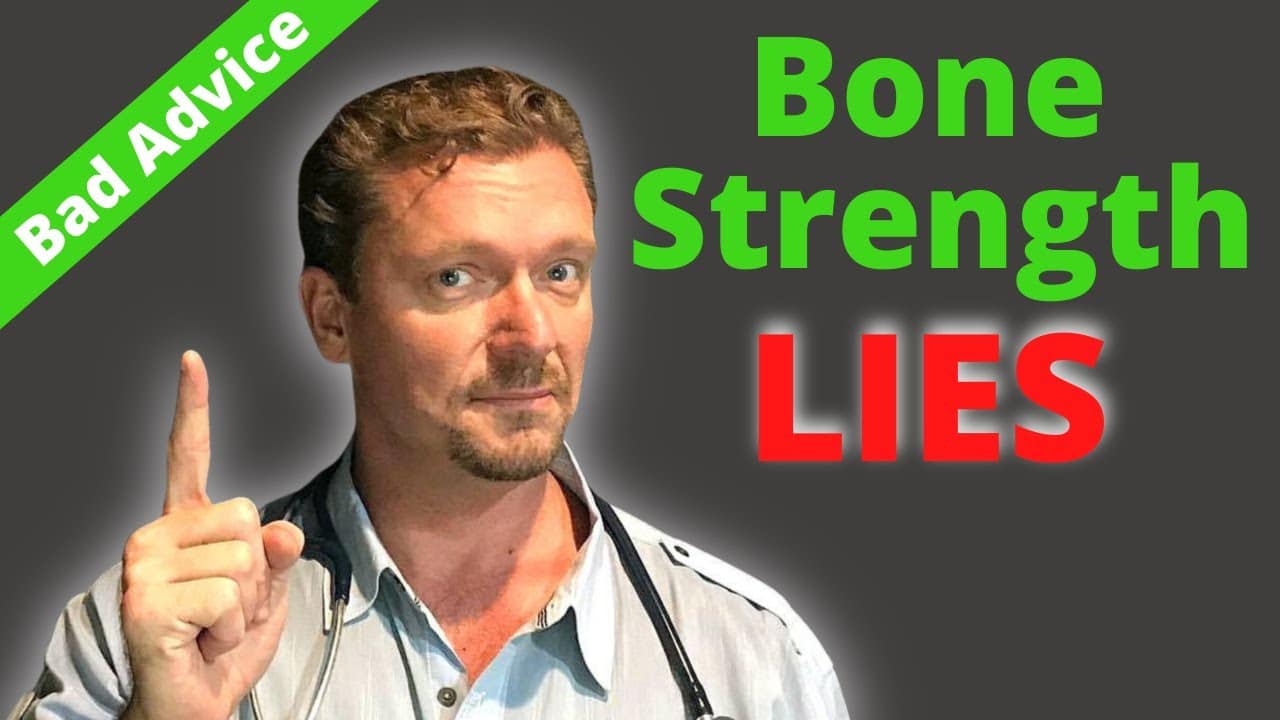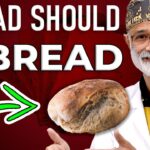*****
Summary of Transcript:
In this video, Dr. Ken Berry discusses the bad advice that doctors often give their patients regarding strengthening bones. He explains that doctors focus on bone density rather than bone strength, which leads to recommending diets that may increase density but weaken bones. The advice he disagrees with includes calorie restrictions for individuals over 40, plant-based diets with a heavy focus on fruits and vegetables, avoiding red meat and eggs, a low-salt diet, moderate alcohol consumption, and diets rich in whole grains and soy. He provides research studies to support his advice and encourages viewers to share this video with anyone worried about bone strength.
*****
Summary of Description:
The video discusses common advice doctors give regarding bone density that is either wrong or harmful. It provides research to support the claim that low Salt and low protein diets lead to weaker bones, women over 50 and those on calorie restriction need more protein, and soft meat diets can weaken bones. The video also suggests taking vitamin K2 for bone strength and recommends supplements such as daily minerals with selenium and real Salt for bone health. However, viewers are advised to consult their doctors and not to use the video as medical advice.
*****
Improving Bone Strength: Separating Fact from Fiction
As we age, our bone strength becomes more and more important. However, the advice given to us by doctors may not always be based on research and common sense. Some of it may be harmful. Some myths and truths about bone density will help you separate fact from fiction.
Low Salt and Low Protein Diets Lead to Weaker Bones
Contrary to popular belief, low Salt and protein diets may lead to weaker bones. According to research, low-protein diets can lead to chronic metabolic acidosis, depleting bone calcium. Similarly, a low-sodium diet can increase bone resorption, weakening the bones.
Women Need More Protein, Especially as They Age
Women need more protein than men, especially as they age. According to a study, women over the age of 65 need twice the amount of protein as younger women. This is because estrogen, a hormone that protects bones, decreases as women go through menopause. Therefore, women need to make up for the loss of estrogen by consuming more protein.
Calorie Restriction Can Hurt Bone Strength
Reducing calories may be good for weight loss, but it may not be beneficial for bone strength. Studies have shown that calorie restriction can lead to decreased bone density and an increased risk of fractures.
Vitamin K2 is Essential for Strong Bones
Vitamin K2 is important for strong bones as it helps to increase bone mineral density and reduce fractures. Studies have also shown that a diet rich in vitamin K2 can reduce the risk of hip fractures by up to 80%.
Real Salt Can Help Maintain Bone Density
Real Salt, which contains various minerals, can help maintain bone density. In particular, it contains magnesium which is essential for the absorption of calcium in the bones. Studies have also shown that low-sodium diets can lead to weaker bones.
Regular Exercise Can Help Strengthen Bones
Regular exercise, especially weight-bearing exercises, can help to strengthen bones. This is because your bones respond to training stress by becoming stronger. However, it is important to consult your doctor before starting any new exercise regimen.
Preventing Osteoporosis: What You Can Do
Osteoporosis is when the bones become weak and brittle, increasing the risk of fractures. While age is a risk factor for Osteoporosis, there are things you can do to reduce your risk.
Include Calcium and Vitamin D in Your Diet
Calcium and vitamin D are essential for strong bones. Calcium helps to build and maintain bones, while vitamin D helps the body absorb calcium. Good sources of calcium include dairy products, leafy greens, tofu, and fish. Exposure to sunlight also helps the body produce vitamin D.
Exercise Regularly
As mentioned before, exercise can help to strengthen bones. Weight-bearing activities such as walking, jogging, and strength training are especially beneficial.
Avoid Smoking and Limit Alcohol Consumption
Smoking can decrease bone density, while heavy alcohol consumption can increase the risk of fractures. Therefore, it is best to avoid smoking and limit alcohol consumption to one to two drinks per day.
Get Regular Bone Density Tests
Regular bone density tests can help you keep track of your bone health. Your doctor can recommend when you should start getting tested.
In conclusion, taking care of your bone health is essential as you age. Separating fact from fiction and making lifestyle changes can prevent Osteoporosis and maintain strong bones.
*****
Source Description
Which foods improve bone strength? What can I do to prevent Osteoporosis? So much advice doctors give based on their personal beliefs and professional ignorance, not research and common sense. Here is a short list of advice doctors provide about bone density that is either just wrong or harmful.
Bone strength is very important as you age, and you deserve the best advice to strengthen your bones.
LIES MY DOCTOR TOLD ME: https://amzn.to/3CgUbo8
Daily Minerals (with selenium): https://bit.ly/MineralFix (discount)
Research:
Low Salt + Low Protein diets lead to weaker bones
https://link.springer.com/article/10.1007%2Fs00198-014-2973-1
https://www.endocrinepractice.org/article/S1530-891X(20)35870-5/fulltext
https://www.ncbi.nlm.nih.gov/labs/pmc/articles/PMC3153395/
https://academic.oup.com/qjmed/article/101/7/583/1527526
Low Sodium common in 50+: https://www.ncbi.nlm.nih.gov/labs/pmc/articles/PMC4110800/
Women need more protein: https://pubmed.ncbi.nlm.nih.gov/11914191/
50+ need more protein: https://link.springer.com/article/10.1007%2Fs40279-016-0504-2
50+ don’t absorb protein as well: https://academic.oup.com/jn/article/150/8/2041/5740155
Calorie restriction & Bone Strength: https://pubmed.ncbi.nlm.nih.gov/1315653/
Low Meat Diet = Weaker Bones: https://bmcmedicine.biomedcentral.com/articles/10.1186/s12916-020-01815-3
Vit K2 for bone strength: https://pubmed.ncbi.nlm.nih.gov/35711002/
Become a PATRON & ask Dr. Berry your questions directly: https://bit.ly/DrBerrysCommunity
REAL SALT for Bone Health: http://bit.ly/RealSalts (discount)
Check your A1c at home: https://bit.ly/A1CatHome (discount)
—– Join me, and let’s optimize your health! —–
Thanks so much to our Prime & Champion Patrons Chris B, Andrew R, Benjamin S, Colin, Jeffery D, Michael K, Shelley L, Sheri M, Stacie P, A_Smith, Amy M, B B, Beth J, Bob C, Charles A, Daniel L, Dean F, Dean P, Dean Z, Debra B, Elizabeth & Brett L, Fuji M, James H, Jeff P, John I, Julie L, Karen A, Karen C, Kevin S, Lisa K, Lori B, Marilynn S, Mary, Michelle G, Mike R, Mitzi C, My’chell V, Paul R, Ralph D, Rick & Kit C, Ron F, Ryane C, Shawn R, Steve H, Suzanne C, Tahane M, Tami H, Tim S, Tina C, Tracey D, 2 Krazy Ketos, Jose A, John C, and Dean Z for helping make this video possible.
My Website: drberry.com
FACEBOOK: facebook.com/kendberry.md/
INSTAGRAM: instagram.com/kendberry.md/
TWITTER: twitter.com/KenDBerryMD
TikTok: @kendberrymd Clapper: @kendberrymd
MeWe: @kendberrymd
Patreon: @kendberrymd
Ken D Berry, MD, is a Family Physician and has been practicing Family Medicine in Tennessee for over 20 years, having seen over 25,000 patients in his career.
Consult your doctor. Don’t use this video as medical advice.
For Collaboration, please email me: at support@drberry.com
Any information on diseases and treatments available at this channel is intended for general guidance only and must never be considered a substitute for the advice provided by your doctor or another qualified healthcare professional.
Always seek the advice of your physician or another qualified healthcare professional’s advice with questions regarding your medical condition.
Although all measures are taken to ensure that the contents of the YouTube channel are accurate and up-to-date, all information on it is provided ‘as is.’
To the extent permitted by mandatory law, Dr. Ken D. Berry shall not be liable for any direct, incidental, consequential, indirect, or punitive damages arising out of access to or use of any content available on this channel, including viruses, regardless of the accuracy or completeness of any such content. As an Amazon Associate, I earn from qualifying purchases.



Comments are closed